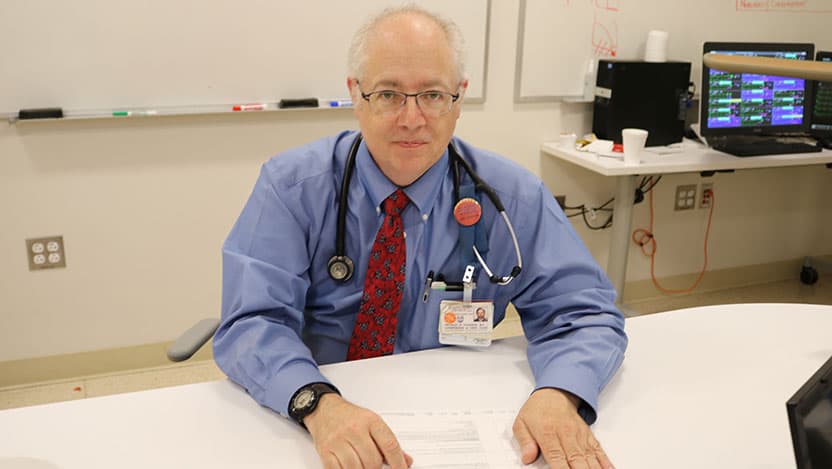Anesthesiologist and critical care physician wins prestigious Burchardi Award

When Michael O’Connor, MD, is on service, every day begins with an Irish joke.
After sharing a laugh, O’Connor, chief of critical care medicine, and his team begin their serious, lifesaving work in the University of Chicago Medicine’s busy and challenging intensive care unit.
“The work can be overwhelming,” O’Connor said. “My job is to keep members of the team relaxed and inspired, help them focus on their patients and get the best performance out of them that I can.”
It’s leadership qualities like these that recently earned O’Connor the prestigious Burchardi Award from the Society of Critical Care Anesthesiologists (SOCCA) and the Society of Critical Care Medicine’s (SCCM) Anesthesiology Section. He received the award in May during the SOCCA meeting in Montreal.
The award isn’t just given to a great doctor, but to a leader who makes an impact on the people they treat and work with, said SCCM spokesman Danny Lysouvakon. The award criteria also mention a few unconventional qualifications, such as “sense of humor” and “humility.”
O’Connor doesn’t like to boast about himself or his awards, which include SCCM’s 2016 Shubin-Weil Award and the 2015 Parker J. Palmer Courage to Teach Award from the Accreditation Council for Graduate Medical Education (ACGME).
He’ll only say he has a knack for “understanding human dynamics” and can get people and teams to work well together.
The doctors who work with him say he does much more than that. Not only is he an outstanding physician, known worldwide, but they praise his diplomatic leadership style.
Anesthesiologist Jennifer Hofer, MD, said she’s been inspired by O’Connor since she first met him in 2006, when she was a medical school student. Describing him as “present” and “a doer,” Hofer said O’Connor creates a very supportive culture in the ICU.
“He’s always available, and he tries to make sure everybody is cared for,” she said. “He makes sure everyone has a clear mind going into things, and he makes sure people get to speak and be heard.”
O’Connor mentored Hofer during her critical care fellowship, and when she started giving anesthesia during liver transplants. To train her for liver transplants, he did what he does for all new faculty doing these complex transplant cases: he’d teach in the operating room, and then sit outside the room in a chair in case there were any questions during the 16-hour-plus procedure.
“I know this sounds cliché, but I called him one morning, when I was on faculty, and I told him, ‘I saved a life last night because of what you taught me,’” she said.
UChicago Medicine colleague Sajid Shahul, MD, said one of the major reasons he moved back to Chicago from Boston was the opportunity to work with O’Connor again. What impresses him most about O’Connor is something he calls “The O’Connor School of Diplomacy.”
Typically, in the ICU, there are four teams consulting on a single patient. There are often different views on the best course of treatment. But O’Connor is a master diplomat, letting each person explain their position, and then manages to come up with a way to get people to agree on things.
“He helps change the focus from our egos, or being right, to what’s best for the patient,” said Shahul, program director for the ICU and vice chair for clinical research in anesthesiology. “He’s one of the best in the world. And he’s trained generations of doctors.”
O’Connor says his strategy is to let everyone be heard, and to try and say yes as much as possible.
“That way, when you say no, it’s striking,” he said.
Opening up his laptop, O’Connor scrolls through a long list of former residents and fellows, many at leading academic medical centers around the country. He’s still in touch with many of them.
“What I’m really proud of? It’s that so many of them have become academics,” he said.
